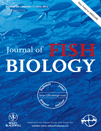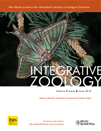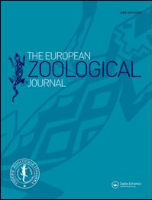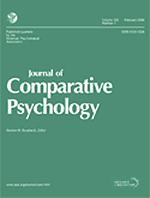
BEHAVIORAL ECOLOGY AND SOCIOBIOLOGY
Scope & Guideline
Connecting Behavior and Environment for Deeper Understanding
Introduction
Aims and Scopes
- Behavioral Ecology:
Research in this area examines how animal behavior is affected by ecological factors, including resource availability, predation risk, and environmental conditions. - Sociobiology:
This involves studying social structures and interactions within and between species, focusing on cooperative behaviors, competition, and social hierarchies. - Evolutionary Biology:
The journal publishes studies that explore the evolutionary implications of behavioral traits, including sexual selection, parental investment, and life history strategies. - Cognition and Learning:
Research examining cognitive processes and learning behaviors in animals is a key focus, including how these processes influence foraging strategies and social interactions. - Conservation Behavior:
The journal also addresses the behavioral aspects of conservation, exploring how behavioral ecology can inform conservation strategies and the impacts of human activities on animal behavior.
Trending and Emerging
- Impact of Anthropogenic Change:
Research focusing on how human activities, such as urbanization and climate change, affect animal behavior and social structures is gaining prominence, reflecting the urgent need to understand these impacts. - Social Networks and Dynamics:
There is a growing interest in studying social networks and the dynamics of social interactions among individuals, which provides insights into cooperation, competition, and communication. - Integrative Approaches to Behavior:
Studies that combine behavioral, ecological, and genetic approaches to understand complex behaviors and their evolutionary implications are increasingly common. - Cognitive Ecology:
Emerging research on the cognitive abilities of animals and how these influence their behaviors in natural settings is trending, with implications for understanding learning and problem-solving. - Microbiome and Behavior:
The exploration of how gut microbiota influences behavior and social interactions is an emerging theme, linking ecological and physiological aspects of animal behavior.
Declining or Waning
- Traditional Ethology:
Research rooted in classical ethological studies appears to be less prominent, as more emphasis is placed on integrating ecological and social dynamics into behavioral studies. - Static Behavioral Observations:
Studies that focus solely on static behavioral observations without considering environmental or social contexts are becoming less common in favor of more dynamic, integrative approaches. - Single Species Studies:
There is a noticeable shift away from research focusing exclusively on single species in isolation, with a trend toward multi-species interactions and ecological networks. - Laboratory-Based Experiments:
While controlled experiments remain important, there is a waning interest in lab-based studies that do not translate well to natural settings, leading researchers to prioritize field studies.
Similar Journals

Journal of Experimental Zoology Part A-Ecological and Integrative Physiology
Empowering research for a sustainable biological future.The Journal of Experimental Zoology Part A - Ecological and Integrative Physiology, published by WILEY, is a distinguished peer-reviewed journal focusing on ecological and evolutionary physiology, providing a robust platform for research that bridges both ecological and integrative physiological concepts. With an impressive impact factor and recognition as a Q1 journal in both Animal Science and Zoology and Ecology, Evolution, Behavior and Systematics in 2023, it positions itself as a leader in advancing our understanding of organismal biology and environmental interactions. The journal is committed to open access, offering researchers and professionals worldwide the opportunity to share and disseminate their findings freely. Since its inception in 2017, it has rapidly gained prominence—ranking within the top percentiles of Scopus Ranks across several disciplines, including genetics and molecular biology. This not only underscores its relevance but also highlights its vital role in facilitating interdisciplinary approaches essential for addressing contemporary biological challenges. Researchers, educators, and students alike will find in this journal a valuable resource for cutting-edge studies and innovative methodologies in the field.

Journal of Vertebrate Biology
Enhancing global awareness through scientific inquiry.Journal of Vertebrate Biology, a reputable publication established by the Institute of Vertebrate Biology in the Czech Republic, serves as a vital platform for research across the fields of Animal Science and Zoology, Aquatic Science, and Ecology, Evolution, Behavior and Systematics. With its ISSN 2694-7684 and a commendable 2023 Q2 ranking in multiple categories, this open-access journal embraces innovative scientific inquiry and fosters academic discourse. The journal's commitment to disseminating high-quality research is reflected in its Scopus rankings, positioning it within the top quartile in several impactful areas. As it continues to converge its focus until 2024, researchers, professionals, and students alike are encouraged to engage with cutting-edge studies that advance our understanding of vertebrate biology. This publication stands out not only in its scholarly contributions but also in enhancing global awareness of biodiversity and conservation issues.

JOURNAL OF FISH BIOLOGY
Pioneering Research in Fish Biology and EcologyJOURNAL OF FISH BIOLOGY, published by Wiley in the United Kingdom, is a distinguished peer-reviewed journal dedicated to advancing the understanding of the biology and relationships of fishes. With a robust history from its inception in 1969 to its future publications extending into 2024, the journal occupies a pivotal position in the academic landscape of aquatic sciences and ecology. Holding a notable Impact Factor and recognized within the second quartile (Q2) for both Aquatic Science and Ecology, Evolution, Behavior and Systematics, it serves as an essential resource for researchers, professionals, and students alike. The journal’s contributors delve into diverse topics ranging from evolutionary biology to conservation strategies, fostering a dynamic interchange of knowledge and innovation within the fish biology community. Access options are currently via subscription, ensuring high-quality, curated content that reflects the latest empirical research and theoretical advancements in the field.

LEARNING & BEHAVIOR
Shaping the Future of Learning and Behavioral ScienceLEARNING & BEHAVIOR is a distinguished academic journal published by SPRINGER that serves as a critical platform for the dissemination of research in the fields of behavioral neuroscience and cognitive psychology. With an ISSN of 1543-4494 and an E-ISSN of 1543-4508, this journal publishes high-quality, peer-reviewed articles that explore the complexities of learning processes and their behavioral implications. Despite its current Q4 status in Behavioral Neuroscience and Q3 in both Cognitive Neuroscience and Experimental and Cognitive Psychology, LEARNING & BEHAVIOR remains a valuable resource for researchers seeking to enhance their understanding of these dynamic fields. The journal has a converged publication timeline from 2003 to 2024, ensuring that it captures emerging trends and innovative methodologies. With robust accessibility options for a diverse readership, the journal fosters a comprehensive academic environment, inviting submissions that contribute to theoretical advancements and practical applications in understanding behavior. Authors and readers are encouraged to leverage this journal to engage with cutting-edge research that drives the behavioral sciences forward.

ACTA ETHOLOGICA
Pioneering Insights into Animal Behavior and SystematicsACTA ETHOLOGICA, published by Springer Heidelberg, is a leading journal in the fields of Animal Science and Zoology, as well as Ecology, Evolution, Behavior, and Systematics. With an ISSN of 0873-9749 and an E-ISSN of 1437-9546, this journal has established itself as a notable platform for innovative research and review articles since its inception in 1998. As of 2023, it holds a Category Quartile of Q3 in both its primary categories, showcasing its commitment to advancing knowledge within these scientific domains. The journal aims to facilitate the dissemination of cutting-edge research on animal behavior and ecology, fostering collaboration among researchers, professionals, and students. While it does not currently offer Open Access options, ACTA ETHOLOGICA remains crucial for those looking to stay informed about the latest developments and trends in ethology. For inquiries, the journal's editorial office is located at Tiergartenstraße 17, D-69121 Heidelberg, Germany.

Integrative Zoology
Inspiring Insights into Ecology and ConservationIntegrative Zoology is a distinguished journal published by WILEY, focusing on advancing the field of zoological sciences through the integration of various biological disciplines. With both ISSN 1749-4877 and E-ISSN 1749-4869 identifiers, this journal features research that fosters a deeper understanding of animal biology, ecology, and conservation strategies. As a testament to its impact, Integrative Zoology is recognized within the Q1 category of Animal Science and Zoology in 2023, ranking an impressive #27 out of 490 journals in its field, placing it in the 94th percentile among peers. Published in the United Kingdom, this journal not only serves as a critical platform for novel research but also engages a global audience, inviting submissions that bridge theoretical and practical aspects of zoology. While not entirely open access, the journal remains committed to disseminating high-quality research that contributes substantially to scientific advancements. Through its continuous publication since 2008, Integrative Zoology aims to inspire researchers, educators, and students alike, making it a cornerstone for anyone passionate about the complexities of animal life.

Movement Ecology
Fostering collaboration to protect our planet's diversity.Movement Ecology is a premier peer-reviewed journal published by BMC, dedicated to advancing knowledge in the vibrant field of ecology, evolution, behavior, and systematics. Established in 2013, this open-access journal provides a platform for the dissemination of innovative research on animal movement and its ecological implications, making critical findings available to a global audience since 2014. With its impressive Q1 ranking in the 2023 category of Ecology, Evolution, Behavior, and Systematics and a commendable Scopus ranking in the 87th percentile, it serves as a leading source of information for researchers, professionals, and students alike. The journal aims to foster interdisciplinary collaboration and promote the application of movement ecology to conservation and management practices, significantly impacting biodiversity research. Located in the vibrant city of London, Movement Ecology continues to shape the landscape of ecological research through its commitment to high standards and accessibility.

European Zoological Journal
Elevating the Study of Animal Sciences Across EuropeEuropean Zoological Journal, published by Taylor & Francis Ltd, is an esteemed open-access publication dedicated to advancing the exciting field of zoology. Since its inception in 2017, this journal has progressively established itself as a vital resource for researchers, professionals, and students alike. With its Q2 ranking in Animal Science and Zoology as of 2023, the journal ranks in the 69th percentile among its peers, showcasing its influence and contribution to the discipline. The journal’s broad scope covers a wide range of topics within zoology, aiming to foster an understanding of animal biology and conservation efforts. As an open-access journal, it not only enhances the dissemination of knowledge but also encourages collaborative research across global communities. Situated in the United Kingdom, the European Zoological Journal invites submissions that contribute to the evolving discourse in animal sciences, and endeavors to support the scientific community in addressing pressing ecological challenges.

JOURNAL OF COMPARATIVE PSYCHOLOGY
Exploring Behavioral Diversity Across SpeciesJOURNAL OF COMPARATIVE PSYCHOLOGY is a prestigious academic journal published by the American Psychological Association, dedicated to advancing the understanding of behavioral processes across diverse species. With its ISSN 0735-7036 and E-ISSN 1939-2087, the journal has been a cornerstone of comparative psychology research since its inception in 1983. It primarily caters to the fields of ecology, evolution, and behavior, ranking impressively in the Q2 quartile in the category of Ecology, Evolution, Behavior and Systematics, and Q3 in the miscellaneous Psychology category as of 2023. This journal serves as a vital platform for disseminating high-quality research, addressing both fundamental questions and applied issues in systematic studies of behavior across species. Although not open access, its rich repository of research articles, meta-analyses, and reviews makes it an indispensable resource for researchers, practitioners, and students striving to deepen their knowledge and foster innovation in comparative psychological studies. With a commitment to rigorous peer review and scholarly excellence, the JOURNAL OF COMPARATIVE PSYCHOLOGY is a key player in shaping the discourse within its field and driving future research.

BIOLOGICAL JOURNAL OF THE LINNEAN SOCIETY
Pioneering insights into evolutionary processes.BIOLOGICAL JOURNAL OF THE LINNEAN SOCIETY is a prestigious, peer-reviewed journal published by Oxford University Press that serves as a leading platform for original research in the fields of ecology, evolution, behavior, and systematics. With its ISSN of 0024-4066 and E-ISSN 1095-8312, this journal has maintained an impressive Q1 ranking in the latest Scopus statistics, which firmly positions it among the top tier of journals in its category (ranked #197 out of 721). Established in 1969, it covers a broad range of topics crucial for understanding biodiversity and the evolutionary processes shaping it, with its coverage extended until 2024. Though it does not operate under an open-access model, it ensures wide visibility and dissemination of impactful research findings. The journal is key for researchers, professionals, and students dedicated to advancing knowledge in biological sciences, fostering interdisciplinary collaboration, and addressing pressing ecological challenges.